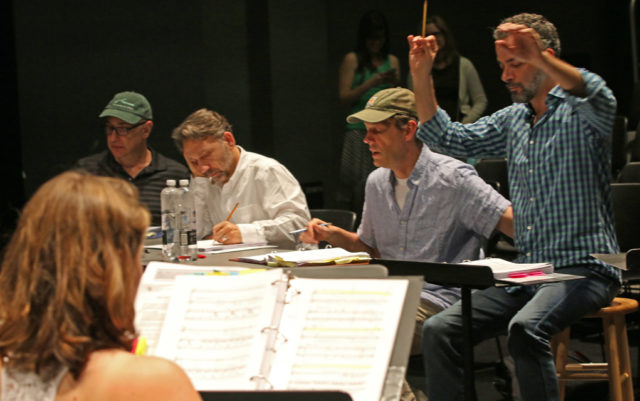
It’s a wonderful life for Jake Heggie right now.
As the composer of two highly successful operas, Dead Man Walking (2000) and Moby Dick (2010), he finds that commissions for his works keep coming.
“People keep asking me,” he says. “A commission is a huge gift.”
Now he is in Boulder to work on his latest opera, based on Frank Capra’s beloved 1946 film It’s a Wonderful Life. Joining him for work at the University of Colorado New Opera Workshop, (CU NOW) are librettist Gene Scheer and staff from the Houston Grand Opera, where the finished opera will have its premiere in December.
Under Leigh Holman, director of CU’s Eklund Opera Program, CU NOW offers composers the opportunity to workshop new operas prior to their first productions. For more than two weeks, they try out their new works with CU student singers and other support staff, seeing what works and what doesn’t, making changes as they go.
“This is the only place that offers such an extensive opportunity to work on [a new] piece, a full cast at your disposal every single day,” Heggie says. “To all the people who have made this possible, CU NOW and Holman and the people here, it’s just an enormous feeling of gratitude.”
After 18 days of intensive work, CU NOW will present performances of selected scenes from It’s a Wonderful Life on Friday, June 17 and Sunday, June 19 in the ATLAS Black Box Theater. Between those two performances, CU NOW will also present scenes by CU student composers on June 18 in the Imig Music Theatre. All three performances are free and open to the public.
“We started making cuts and changes right away, the first day,” Heggie says. “To be able to do this much work [before the premiere] is an enormous gift. You have to get a general view of what’s working and what’s not, as you revise.
“The only way to learn about a piece is to see it on stage, with an audience. That’s why Broadway shows do weeks of previews, because the final character in any theater piece is the audience.”
In the rehearsal I attended, Heggie was making detailed changes in the score — adding or cutting one or two measures here and there, changing individual notes in the singers’ parts and, in one case, telling a singer who added a touch he liked, “Keep that!”
Heggie and Scheer approached It’s a Wonderful Life knowing that it is a deeply loved film.
“I initially was worried about the iconic nature of the film,” Scheer says of his adaptation for the operatic stage. “But in for a penny, in for a pound, you just dive in and do it. In opera what’s carrying the marrow of the matter is the music. So the point is, how do you distill those images [of the film] into a musical language that allows music to do what it does best — to communicate the emotional landscape of the story.”
“Our goal,” Heggie adds, “was to create magic, beauty, drama, great passion and tell this story that people know from the film, but to tell it in a very fresh way. Gene has found a very magical way to tell the story. It’s surprising and it’s completely different from the film. It’s fresh and innovative and it inspired me enormously. The worst mistake you could make would be to try to put the movie on the stage.”
Scheer agrees. “I love the idea of people seeing it fresh and being surprised,” he says. “For those who have seen the film and love the film, like I do, part of the fun of it is to be surprised.”
CU NOW is thriving at a time when there is an abundance of new opera being written in this country. One reason for American opera’s recent success is the use of subjects that are part of our shared American culture. For example, recent seasons have seen premieres of operas on Manchurian Candidate (by Kevin Puts, Minnesota Opera), JFK (David T. Little, Ft. Worth Opera), Dolores Claiborne (Tobias Picker, San Francisco), Cold Mountain (Jennifer Higdon, Santa Fe), The Scarlet Letter (Lori Laitman, Opera Colorado) and The Shining (Paul Moravec, Minnesota Opera).
“It’s a very exciting time,” Heggie says. “[American opera] has blossomed and flowered into something really remarkable.”
Heggie has no doubt about the importance of CU NOW in the creative process. “Before the workshop, it’s all abstract,” he says. “The opportunity to hear it really sung by different color voices and the different range of voices is huge.
“If, hopefully, it’s successful in December, a lot of that could be attributed to the fact that we had this time in Boulder.”














